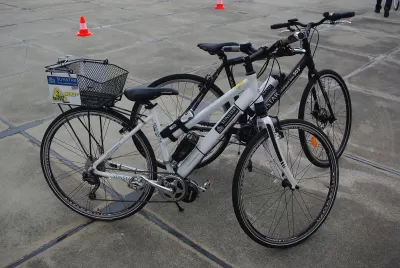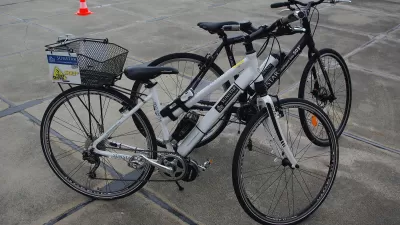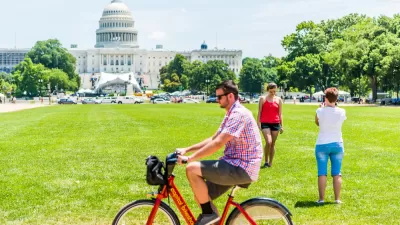The popularity of electric bikes doesn't seem to be waning as the devices outpace electric car sales by almost two to one.

As John Surico reports, the e-bike boom that began during the pandemic has not slowed down as more Americans continue to go electric on two wheels.
Electric bike sales outpace electric car sales by almost two to one, writes Surico. "While estimates vary, industry experts put the number of e-bikes Americans brought home in 2020 somewhere around half a million [e-bikes]." A Deloitte projection estimated that 130 million bikes would sell between 2020 and 2030.
The article cites three trends that David Zipper, a specialist in new mobility, points to as responsible for the "exploding appetite" for e-bikes: the development of smaller, more efficient and longer-lasting lithium-ion batteries; a global resurgence in the popularity of biking; and the rise of bike share programs, which let new riders experience e-bikes at a low cost.
Electric bikes pose new regulatory challenges as cities figure out how to classify and govern the various types of devices, particularly as newer models offer faster speeds and behave more like mopeds than bicycles. Meanwhile, bike advocates call for safer, more robust infrastructure to protect riders and encourage more people to get on bikes.
But advocates are hopeful that e-bikes can revolutionize transport and help fight climate change by providing a critical middle ground between bikes and cars, especially as new federal legislation provides incentives and tax credit for e-bike owners.
FULL STORY: The Popularity of E-Bikes Isn’t Slowing Down

Study: Maui’s Plan to Convert Vacation Rentals to Long-Term Housing Could Cause Nearly $1 Billion Economic Loss
The plan would reduce visitor accommodation by 25,% resulting in 1,900 jobs lost.

North Texas Transit Leaders Tout Benefits of TOD for Growing Region
At a summit focused on transit-oriented development, policymakers discussed how North Texas’ expanded light rail system can serve as a tool for economic growth.

Why Should We Subsidize Public Transportation?
Many public transit agencies face financial stress due to rising costs, declining fare revenue, and declining subsidies. Transit advocates must provide a strong business case for increasing public transit funding.

How to Make US Trains Faster
Changes to boarding platforms and a switch to electric trains could improve U.S. passenger rail service without the added cost of high-speed rail.

Columbia’s Revitalized ‘Loop’ Is a Hub for Local Entrepreneurs
A focus on small businesses is helping a commercial corridor in Columbia, Missouri thrive.

Invasive Insect Threatens Minnesota’s Ash Forests
The Emerald Ash Borer is a rapidly spreading invasive pest threatening Minnesota’s ash trees, and homeowners are encouraged to plant diverse replacement species, avoid moving ash firewood, and monitor for signs of infestation.
Urban Design for Planners 1: Software Tools
This six-course series explores essential urban design concepts using open source software and equips planners with the tools they need to participate fully in the urban design process.
Planning for Universal Design
Learn the tools for implementing Universal Design in planning regulations.
Ascent Environmental
Borough of Carlisle
Institute for Housing and Urban Development Studies (IHS)
City of Grandview
Harvard GSD Executive Education
Toledo-Lucas County Plan Commissions
Salt Lake City
NYU Wagner Graduate School of Public Service





























